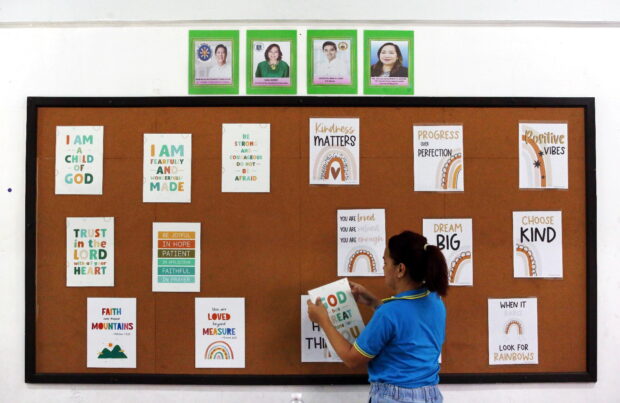Teachers must have say on classroom visual aids – PBEd

Grade 2 teacher Jennifer Rivares starts removing laminated posters with inspirational lines that she made for her students last August 2022 in Pasig Central Elementary School during Brigada Eskwela. (File photo by LYN RILLON / PHILIPPINE DAILY INQUIRER)
MANILA, Philippines — The private sector-backed advocacy group Philippine Business for Education (PBEd) on Wednesday urged the government to leave it to school officials to decide whether to retain visual aids on the walls of classrooms for the benefit of their students.
PBEd Executive Director Justine Raagas said that while they support the initiative to declutter classrooms to help students focus, there was also merit in allowing teachers to keep certain learning tools highly visible.
“We really hope that it becomes up to the teachers and school principals to kind of decide what (materials) can remain. If it helps in learning, then they can remain,” Raagas told reporters on the sidelines of a forum PBEd organized in Makati City.
Sara’s observations
The PBEd official was weighing in on the directive issued by Vice President and Education Secretary Sara Duterte for public schools to strip classroom walls of visual aids, including photos of national heroes and presidents, supposedly to help students “focus” on their teacher and their lessons.
Department of Education (DepEd) Order No. 21, or the implementing guidelines for this year’s “Brigada Eskwela” campus cleanup drive, said all schools should ensure that campus grounds, classrooms and other facilities are free of unnecessary artworks, decorations, tarpaulins and posters.
Article continues after this advertisement“Classroom walls shall remain bare and devoid of posters, decorations or other posted materials. Classrooms should not be used to stockpile materials and should be clear of other unused items or items for disposal,” the order read.
Article continues after this advertisementThe DepEd spokesperson, Undersecretary Michael Poa, said the order stemmed from Duterte’s observation from her rounds of public schools that many rooms had kept years-old visual aids that were already “distracting” to the students.
“I know that President Marcos and all other former presidents and all heroes past and present will not at all be bothered if learners focus on their teachers, lessons, projects and assignments,” Duterte said in a statement.
“The order is what it is. Take out everything on the wall and let learners focus on their studies. Classrooms and schools should be clean, orderly and functional,” Duterte added.
Tables, alphabet
Asked what visual aids may be kept, Raagas said these could include materials that directly help students with numerical literacy and reading, such as multiplication tables and the alphabet.
A similar position was expressed last week by the Alliance of Concerned Teachers -National Capital Region. In a statement, the teachers’ union said that instead of getting rid of decorations in classrooms, DepEd should relieve educators of the various extra tasks they are made to do without proper compensation.
More than the issue of visual aids, PBEd said, it is also important to ensure that the classrooms are conducive to learning. This means classrooms should be well-ventilated, have enough space for students, and safe from the harsh elements, Raagas said.
Job-skills mismatch
The advocacy group is also pushing for greater collaboration among government agencies, industry leaders and academic institutions to address the perennial problem of job-skills mismatch.
“At the heart of successful workforce development systems is a meaningful collaboration among the government, industry and academe,” said PBEd Trustee George Barcelon, who is also the president of the country’s largest business organization, the Philippine Chamber of Commerce and Industry.
“By aligning educational curricula with industry requirements, we create pathways of success for our graduates who are equipped with exact skills and knowledge sought by the job market,” Barcelon added.
PBED, along with representatives from the International Labor Organization and the Technical Education Skills Development Authority (Tesda), are holding a two-day forum that started on Wednesday to tackle the issue.
The discussions are focusing on the best practices and lessons shared by experts from the United Kingdom, the Department of Trade and Industry (DTI), the Commission on Higher Education, and three other organizations.